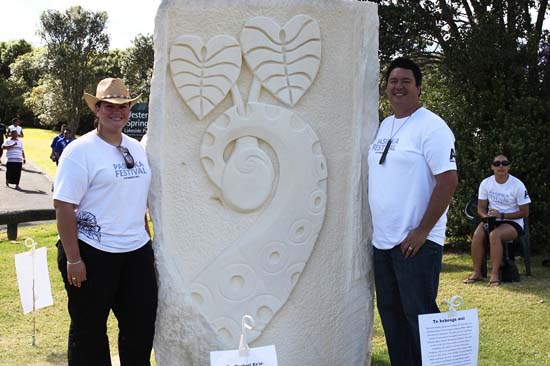
The ‘Eke Pasifika rock sculpture – named after the Cook Islands Māori word for octopus – was one of the highlights at this weekend’s Pasifika Festival Day.
Novice carvers were given the opportunity to work alongside Tongan and Māori master carvers Filipe Tohi and Daryl Thompson and other Pacific artists.
"An exciting new challenge," says AUT University’s novice carver Dr Rachel Ka'ai-Mahuta describing the experience.
Launched in 2008, and centred round the annual Pasifika Festival, the project has produced one sculpture a year and sees carvers from throughout the Pacific contributing.
Long-time project supporter Hilary Scothorn-Tohi, wife of master sculptor Filipe, says it encourages the exchange of ideas and techniques.
Dr Rachel Mahuta and Dr Dean Mahuta, lecturers from AUT's Te Ara Poutama faculty, and Te Wheka a Toi, post-doctorate fellows, were among the novices.
With AUT sponsoring the 2011 event, involvement by two staff members in the last of the four sculptures seems fitting.
Humbling honour
"It was an honour to be asked, Dean and I both felt really humbled,” says Dr Ka'ai-Mahuta.
“To work with someone of Filipe Tohi's calibre for a week was pretty amazing."Dr Ka'ai-Mahuta is of Ngāti Porou, Ngai Tahu and Kanaka Maoli (Native Hawaiian) descent, and has ancestral links to the Cook Islands and Samoa.
Dr Mahuta is from Waikato and is of Ngāti Mahuta descent.
Other carvers to contribute to the 2011 sculpture were Steeve Thomo from New Caledonia and Anee Roxbourgh, of Kiribati descent.
Thomo is recognised for carving and visual art, and has had commissioned pieces in the Tjibaou Art Centre near Noumea.
He has exhibited in France and New Zealand in the group show “Pasifikana” with Siapo Arts Association from New Caledonia.
Roxbourgh is a student at Unitec studying interior design. She is of Kiribati descent with ties to Fiji, Tonga and Scotland.
The Pasifika rock sculpture project has included carvers from all over the Pacific, including Aotearoa/New Zealand, Cook Islands, Fiji, Hawai’i, Kiribati, New Caledonia, Niue, Samoa, Tahiti, Tokelau, Tonga and Tuvalu.
The sculptures, made from Oamaru stone and weighing between three and four tonnes each, will be moved to their final resting place at AUT’s Manukau Campus on permanent loan later this year.



